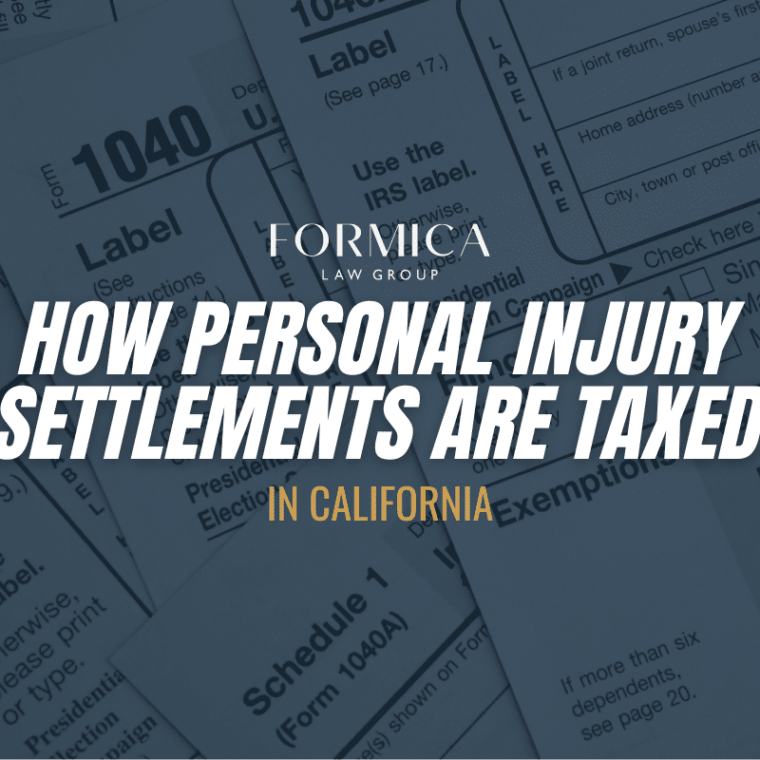Personal injury settlements are complex and can be confusing, especially when it comes to taxes. At Formica Law Group, we understand that the financial implications of a settlement are crucial for our clients. This guide aims to clarify how personal injury settlements are taxed in California, ensuring you have the knowledge necessary to make informed decisions.
Understanding Personal Injury Settlements
Before we dig into the tax specifics, it’s essential to understand what a personal injury settlement entails. A personal injury settlement is compensation awarded to an individual who has suffered harm due to another party’s negligence or intentional actions. This compensation can cover various damages, including medical expenses, lost wages, pain and suffering, and more.
Types of Damages in Personal Injury Settlements
- Compensatory Damages:
- Economic Damages: Cover tangible losses such as medical bills, lost wages, and property damage.
- Non-Economic Damages: Compensation for intangible losses like pain and suffering, emotional distress, and loss of consortium.
- Punitive Damages: Intended to punish the defendant for particularly egregious conduct and deter future misconduct.
Taxability of Personal Injury Settlements
In California, the taxability of personal injury settlements depends on the type of damages awarded. The Internal Revenue Service (IRS) and the California Franchise Tax Board (FTB) provide guidelines on which portions of a settlement are taxable.
Tax-Free Compensation
Generally, compensatory damages for physical injuries or physical sickness are not taxable. According to IRS Publication 4345, settlements or awards received for personal physical injuries or physical sickness are excluded from gross income. This means you do not have to pay federal or state income taxes on these amounts.
Medical Expenses
Compensation for medical expenses related to the treatment of physical injuries or sickness is also tax-free, provided you did not previously deduct these medical expenses on your tax return. If you did, you must include the reimbursement in your income to the extent that the medical deduction provided a tax benefit.
Pain and Suffering
Damages received for pain and suffering are not taxable if they stem from a physical injury or physical sickness. However, if the pain and suffering damages are awarded for emotional distress not related to a physical injury, they may be subject to taxation.
Taxable Compensation
Certain components of a personal injury settlement are taxable. It’s crucial to distinguish these to avoid unexpected tax liabilities.
Lost Wages
Compensation for lost wages is considered taxable income. Since lost wages are intended to replace earnings, they are subject to the same taxes as regular wages. This includes federal and state income taxes, as well as payroll taxes such as Social Security and Medicare.
Punitive Damages
Punitive damages are always taxable, regardless of whether they are related to a physical injury or not. These damages are meant to punish the wrongdoer rather than compensate the injured party for a loss.
Emotional Distress
Damages for emotional distress or mental anguish are taxable if they are not directly attributable to a physical injury or physical sickness. If you receive compensation for emotional distress that does not stem from a physical injury, this amount must be included in your gross income. However, medical expenses associated with treating emotional distress may be deducted from the taxable amount, provided you did not previously deduct them on your tax return.
Interest on Settlement
Any interest earned on a personal injury settlement is taxable. If a settlement includes interest payments, this interest must be included as income on your tax return.
Special Considerations for California
While federal tax laws generally govern the taxability of personal injury settlements, California has its own set of rules that may impact your settlement.
State Taxation
California generally conforms to federal tax laws regarding personal injury settlements. This means that compensatory damages for physical injuries or physical sickness are not subject to California state income tax. However, as with federal taxes, portions of the settlement that are taxable under federal law will also be taxable under California state law.
Structured Settlements
A structured settlement is an arrangement where the injured party receives periodic payments over time rather than a lump sum. This can have significant tax implications. Generally, the principal amount received in a structured settlement for physical injury is tax-free, but any interest or earnings on the settlement payments may be taxable.
Practical Tips for Managing Tax Implications
Navigating the tax implications of a personal injury settlement can be challenging. Here are some practical tips to help you manage your settlement effectively:
Consult a Tax Professional
Given the complexities involved, consulting with a tax professional who has experience with personal injury settlements is highly recommended. They can help you understand the tax implications and assist in filing your tax returns correctly.
Keep Detailed Records
Maintain thorough records of all correspondence, agreements, and payments related to your settlement. This includes medical bills, receipts, and documentation of any deductions taken on prior tax returns.
Understand Your Settlement Agreement
Ensure that your settlement agreement clearly outlines the nature of each component of the compensation. This can help in accurately determining the taxability of different portions of the settlement.
Plan for Tax Payments
If a portion of your settlement is taxable, plan ahead to set aside funds for tax payments. This can prevent surprises when tax season arrives and help you manage your finances more effectively.
Call Our Award-Winning Personal Injury Law Firm Now
Understanding how personal injury settlements are taxed in California is crucial for anyone navigating the aftermath of a personal injury case. At Formica Law Group, we strive to provide our clients with the knowledge and resources needed to make informed decisions. While compensatory damages for physical injuries are generally tax-free, other components of a settlement, such as lost wages and punitive damages, may be taxable.
By consulting with tax professionals and keeping detailed records, you can effectively manage the tax implications of your settlement. If you have any questions or need assistance with your personal injury case, contact Formica Law Group today. We’re here to help you every step of the way.

